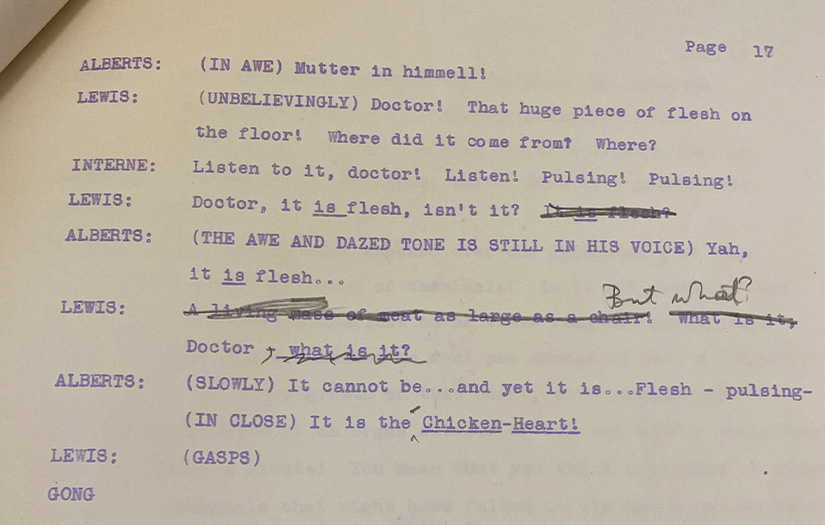-and-
“Chicken Heart,” a 7-minute episode of the “Lights Out” radio series that aired just before midnight in March 1937 was a cheesily effective landmark of the Golden Age of Radio.
Source: Library of Congress
October 22, 2024
Posted by: Neely Tucker
Living on for decades through rebroadcasts, remakes, in syndication and on records, it snaked its way into the childhood memories of everyone from horror master Stephen King to comedian Bill Cosby, becoming a campy horror cult favorite. It was the brainchild of playwright Arch Oboler, a major star of radio whose name has since faded from popular recognition.
The panic? You could feel it coming through the illuminated dial of your radio. Darkness had fallen. Static and interference. Sirens. Screams. The implacable monster. The scientist who knows humanity is the walking dead.
“All mankind, doomed!” he cries.
And this merciless beast of death is … is … a chicken heart.
Yes, friends, it really happened. “Chicken Heart,” a seven-minute episode of the “Lights Out” radio series that aired just before midnight in March 1937 was a cheesily effective landmark of the Golden Age of Radio. Living on for decades through rebroadcasts, remakes, in syndication and on records, it snaked its way into the childhood memories of everyone from horror master Stephen King to comedian Bill Cosby, becoming a campy horror cult favorite.
It was the brainchild of the singular Arch Oboler, a 5-foot, 1-inch titan of radio drama from the 1930s to the 1950s. He was rich, he was famous, he worked with everybody who was anybody — Bette Davis, James Stewart, Claude Rains, Joan Blondell — and influenced everything from radio classics such as “Inner Sanctum” to television’s “The Twilight Zone.” He was shocking people with “Chicken Heart” a year before Orson Welles’ famous “War of the Worlds” radio broadcast in 1938.
“…no discussion of the phenomenon of radio terror, no matter how brief, would be complete without some mention of the genre’s prime auteur — not Orson Welles, but Arch Oboler, the first playwright to have his own national radio series, the chilling Lights Out,” King wrote in “Danse Macabre,” his 1981 book on the horror genre.

The Library preserves Oboler’s papers, recordings, screenplays, short stories and so on. It’s a big collection — 364 boxes, 107 tape reels, 127 cassettes, a total of some 127,000 items — for Oboler lived a big, busy life. Frank Lloyd Wright designed his house (though it was never fully built). After radio began to diminish in pop culture, he wrote and directed one of the first 3D films, “Bwana Devil,” a hit in 1952 and was working until his death in 1987.
Going through folder after folder, box after box — the correspondence and notebooks and contracts and newspaper clippings all seem infused with the man’s restless energy, a writer so wound up he lay in bed at night, smoking cigarettes while dictating dialogue so a secretary could type it up into gold the next day.
In the collection, you’ll find what appears to be the original “Chicken Heart” script, with plenty of penciled edit marks. An NBC-branded title sheet lists the airdate as Wednesday, March 10, 1937, from 11:30 to midnight on Chicago’s WMAQ. (You can come into the Library to hear various recordings of the show, but it’s easier to stream on any number of websites; it’s not hard to find.)
It was the most unforgettable “Lights Out” episode, King wrote, both in spite and because of its ridiculous premise.
“Part of Oboler’s real genius,” King wrote, “was that when ‘Chicken Heart’ ended, you felt like laughing and throwing up at the same time.”
We’ll get to the plot — and that classic ending — in just a second.
Suffice it to say for now that, as the decades passed, new generations of kids heard it rebroadcast and word of mouth spread all over again. Cosby, at the height of his comedy career in the mid-1960s included a stand-up bit about it scaring him so bad as a kid that he set the family’s couch on fire. He included it on “Wonderfulness,” a 1966 comedy album, and told it again on his animated television show “Fat Albert and the Cosby Kids” in the 1970s.
A Chicago native born into a working class, highly cultured Jewish family in 1909, Oboler loved music and stories with big ideas, things that took on the issues of the day. He broke into radio in the late 1920s, writing for variety and drama broadcasts in his hometown.
“Lights Out” and its creepy little heart was created by Wyllis Cooper, an NBC writer in Chicago, in 1934. The 15-minute show, airing at midnight, was replete with the supernatural, gory deaths and wild sound effects. It was a hit, soon expanding to half an hour, and Wyllis moved on to Hollywood.
Oboler took over in and made the show his own. He put the era’s fascination with science and sweeping international politics into bizarre settings. He used stream-of-consciousness narration, ironic settings and radio’s gift for horror — listeners could never see the monster, the thing, the terror.
His first show was about a paralyzed girl who was buried alive. Listeners were outraged, appalled and fascinated. He ran “Lights Out” for two years (and would return off and on over the next decade), but moved on to more substantial fare.
“Bathysphere,” a 1939 radio play, was later inducted into the Library’s National Recording Registry. By then, he had his own show, “Arch Oboler’s Plays.” His story collection, “Fourteen Radio Plays,” was, according to the dust jacket, “the first collection of radio plays by a single dramatist to ever to appear in book form.”
In 1941, Radio magazine called him “the richest writer in the world” (he was getting $3,000 for half-hour episodes of a new series). The magazine good naturedly said he was “a wack job” who had a face like a “gnome” and was “the worst dressed writer in the world.”
It’s unlikely that any of that was literally true — but, hyperbole aside, in the years before another beast called television took over the world, the magazine accurately said he showed “radio’s place as an important drama medium, one with great possibilities.”
Oboler was brilliant, King observed, at radio’s dialogue-as-description, throwing out an idea that triggered the mind’s “innate obedience, its willingness to try to see whatever someone suggests it see, no matter how absurd. … Radio is, of course, the ‘blind’ medium, and only Oboler used it so well or so completely.”

OK, ready? Here’s what happened in “Chicken Heart.” (You’ve been warned!)
Dr. Leon Alberts, a scientist, had kept a tiny chicken heart beating in a test tube for 17 months as part of an experiment. The tube was accidentally knocked over and broken, the chicken heart got mixed in with some chemicals. When the staff comes back to the lab, they find that the little heart has grown into a thick, fleshy thing the size of a chair … and it is both (a) still growing, doubling in size by the hour, and (b) still beating.
Neither process can be stopped. Water, fire, ammo, bombs — nothing. It spreads over the lab, town, state, nation, continent, planet, blub-blub, blub-blub, a fleshy, pulsing blob, still beating, still growing, smothering everything on Earth.
In manic desperation, Alberts finally rushes to a prop plane with a pilot, trying to outrun it. Alberts monologues about mankind’s hubris — and suddenly the plane’s engines splutter!
“The motor! It’s cut out!” the pilot shouts wildly. “We’re in a spin! I can’t get out of it!”
“I told you,” the doctor says grimly. “Doomed!”
“No! NO!” the pilot shouts. “NNNOOO!! We’re falling right into it! Into the heart!”
He screams. The whine grows louder, the wind rushing, the plane in free fall. The chicken heart beats louder. Blub-blub, BLUB-BLUB.
And then a sickening wet splat. The end. A gong sounds. Seven minutes and change, the whole episode, a bit of American pop culture history that just wouldn’t die.





